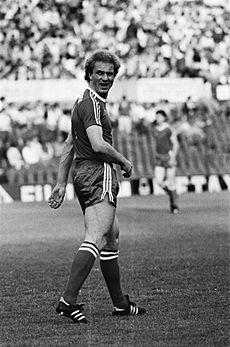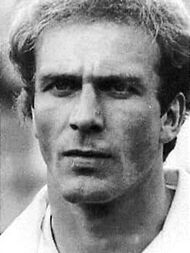Karl-Heinz Rummenigge facts for kids
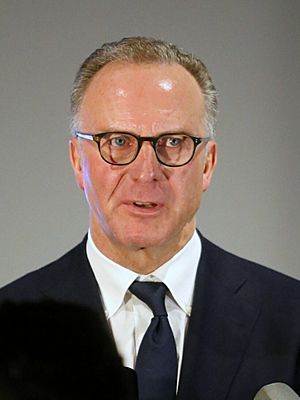
Rummenigge in 2015
|
|||||||||||||||||||||||||
| Personal information | |||||||||||||||||||||||||
|---|---|---|---|---|---|---|---|---|---|---|---|---|---|---|---|---|---|---|---|---|---|---|---|---|---|
| Date of birth | 25 September 1955 | ||||||||||||||||||||||||
| Place of birth | Lippstadt, West Germany | ||||||||||||||||||||||||
| Height | 1.82 m (6 ft 0 in) | ||||||||||||||||||||||||
| Position(s) | Forward | ||||||||||||||||||||||||
| Youth career | |||||||||||||||||||||||||
| 1963–1974 | SV Lippstadt 08 | ||||||||||||||||||||||||
| Senior career* | |||||||||||||||||||||||||
| Years | Team | Apps | (Gls) | ||||||||||||||||||||||
| 1974–1984 | Bayern Munich | 310 | (162) | ||||||||||||||||||||||
| 1984–1987 | Inter Milan | 64 | (24) | ||||||||||||||||||||||
| 1987–1989 | Servette | 50 | (34) | ||||||||||||||||||||||
| Total | 424 | (220) | |||||||||||||||||||||||
| International career | |||||||||||||||||||||||||
| 1975 | West Germany B | 1 | (0) | ||||||||||||||||||||||
| 1976–1986 | West Germany | 95 | (45) | ||||||||||||||||||||||
|
Medal record
|
|||||||||||||||||||||||||
| *Club domestic league appearances and goals | |||||||||||||||||||||||||
Karl-Heinz "Kalle" Rummenigge, born on September 25, 1955, is a famous German football legend. He was an amazing player and later became a top leader at Bayern Munich. Many people think he is one of the best German footballers ever!
As a player, Rummenigge had his biggest successes with Bayern Munich. He helped them win the Intercontinental Cup and two European Cup titles. He also won two German league titles and two domestic cups. Rummenigge won the prestigious Ballon d'Or award twice, in 1980 and 1981. In 2004, the legendary player Pelé even included him in his FIFA 100 list of the world's greatest living players.
Rummenigge was also a key player for the West Germany national team. He won the 1980 European Championship. He also helped his team reach the finals of the 1982 FIFA World Cup and the 1986 World Cup.
After his playing career, Rummenigge became a leader in football management. He was the chairman of the European Club Association (ECA) from 2008 to 2017. He also represented the ECA on the UEFA Executive Committee until 2024.
Contents
Club Career Highlights
Karl-Heinz Rummenigge was born in Lippstadt, Germany. He started his professional journey with Bayern Munich in 1974. He joined them from a smaller amateur team, Borussia Lippstadt.
Early Days at Bayern Munich
When he first joined, Rummenigge was known for his amazing dribbling skills. He was great at running with the ball. Over time, he also became a fantastic goal scorer. This happened especially after coach Pal Csernai joined the team in 1979.
In the 1979–80 season, Rummenigge scored 26 goals. This made him the top scorer in the Bundesliga (Germany's main football league) for the first time. He repeated this achievement in 1981 and 1984, scoring 29 and 26 goals.
Winning European Cups
With Bayern, Rummenigge won the European Cup twice. These wins were in 1975 and 1976. In 1975, he didn't play in the final match. But in 1976, he helped his team beat AS Saint-Étienne to win the cup. That same year, Bayern also won the Intercontinental Cup. They defeated Cruzeiro EC from Brazil.
During this time, Rummenigge teamed up with midfielder Paul Breitner. They were such a strong duo that fans called them "Breitnigge."
Domestic Success and Personal Awards
The team, sometimes called "FC Breitnigge," won the Bundesliga title in 1980 and 1981. They also won the DFB-Pokal (German Cup) in 1982 and 1984. They almost won the European Cup again in 1982 but lost to Aston Villa in the final. Rummenigge was the top scorer in that European Cup season with 6 goals.
His great performances earned him individual awards. In 1980, he was named German Footballer of the Year. In 1980–81, he was named the European Footballer of the Year.
Moving to Italy and Switzerland
In 1984, when he was 29, Rummenigge moved to Inter Milan in Italy. He was sold for a record fee of about €5.7 million. He started well, helping Inter compete for the league title in 1984–85. However, his time in Italy was often affected by injuries.
After his contract ended in 1987, Rummenigge moved to Servette FC in Switzerland. He finished his playing career there. In his last season, 1988–89, he was the top scorer in the Swiss league with 24 goals.
International Career with West Germany
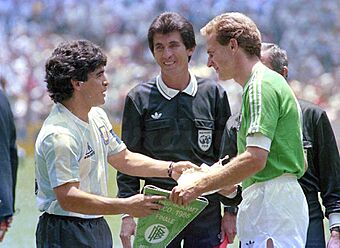
Rummenigge played for the West Germany national team in three FIFA World Cup tournaments. These were in 1978 (Argentina), 1982 (Spain), and 1986 (Mexico).
World Cup Appearances
In 1978, West Germany did not make it past the second group stage. In both 1982 and 1986, his team finished as runner-up. They lost to Italy in 1982 and Argentina in 1986. This means he captained his country to two World Cup silver medals.
European Championship Success
Rummenigge also played in two European Championship tournaments. In the 1980 competition in Italy, West Germany beat Belgium 2–1 in the final. This win gave them their second UEFA Euro title.
Overall, Rummenigge played 95 games for West Germany between 1976 and 1986. He scored 45 goals. This included an important goal in extra time during the 1982 World Cup semi-final against France. He also scored a goal in the 1986 World Cup final against Argentina. In the 1982 World Cup, he scored three goals in one game against Chile.
Playing Style
Rummenigge was known as a very talented attacking player. He could play in many different forward positions. He was fast, great at dribbling, and good at heading the ball. He could score goals from both close range and from far away. He was also praised for being able to score from tricky situations.
He was strong and could use both feet well. He was also a leader on the field. However, injuries affected his career later on, especially when he played for Inter Milan.
Life After Playing: Bayern Munich Management
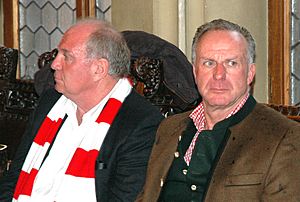
In 1991, Rummenigge returned to Bayern Munich as a vice president. He held this role until 2002. Then, he became the Chairman of the Executive Board for the club's football department. In this role, he was in charge of the club's public relations and international matters.
During his time as chairman, Bayern Munich moved to their new stadium, the Allianz Arena. He stepped down from his CEO position on July 1, 2021. Oliver Kahn took over his role. Rummenigge was later appointed to the club's supervisory board in May 2023.
Other Interesting Facts
- In April 1983, a British pop duo called Alan & Denise released a song about him! It was called "Rummenigge" and reached number 43 in the German music charts.
- From 1990 to 1994, Rummenigge worked as a TV commentator for Germany national team matches.
- His brother, Michael Rummenigge, was also a notable footballer. He played as a forward for Bayern Munich and Borussia Dortmund.
- Karl-Heinz Rummenigge and his wife Martina have three sons and two daughters.
Honours and Awards
Bayern Munich
- Bundesliga: 1979–80, 1980–81
- DFB-Pokal: 1981–82, 1983–84
- European Cup: 1974–75, 1975–76
- Intercontinental Cup: 1976
West Germany
- UEFA European Championship: 1980
- FIFA World Cup runner-up: 1982, 1986
Individual Awards
- Ballon d'Or: 1980, 1981
- Bundesliga Top Goalscorer: 1979–80, 1980–81, 1983–84
- Footballer of the Year (Germany): 1980
- UEFA European Championship Team of the Tournament: 1980
- Onze d'Or: 1980, 1981
- European Cup Top Goalscorer: 1980–81
- FIFA World Cup Silver Shoe: 1982
- FIFA World Cup Bronze Ball: 1982
- FIFA World Cup All-Star Team: 1982
- Swiss League Top Goalscorer: 1988–89
- FIFA 100 (one of the greatest living footballers chosen by Pelé)
- Golden Foot, as football legend: 2009
- Italian Football Hall of Fame: 2021
See also
 In Spanish: Karl-Heinz Rummenigge para niños
In Spanish: Karl-Heinz Rummenigge para niños
- List of European association football families
 | Charles R. Drew |
 | Benjamin Banneker |
 | Jane C. Wright |
 | Roger Arliner Young |


